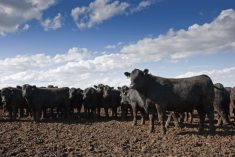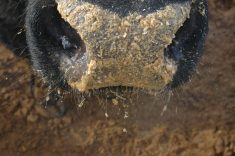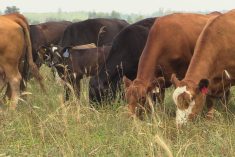The feeder market was hard to define this week. The quality of yearlings was quite variable. Fleshier types were heavily discounted while quality packages were unchanged from seven days earlier. Calf prices were mostly unchanged; however, values were down $4-$6 in drier pockets of southern Saskatchewan and southern Manitoba. Southern Alberta barley prices were quoted from $340 to $360 per tonne last week, up $10-$20 from earlier in May.
Alberta packers were buying fed cattle on a dressed basis in the range of $273-$276 last week, up from the range of $270-$272 seven days earlier. Wholesale beef prices are trading near historical highs, which has caused fed cattle market to experience a counterseasonal trend. Rising consumer incomes, increased consumer spending and the ongoing vaccine rollout are resulting in stronger beef demand.
Read Also

U.S. grains: CBOT soybeans, corn, wheat fall in USDA data aftermath
Chicago grains took a dive on Friday, following a closely watched U.S. government crop report and the release of export data that could provide clues into Chinese buying.
In central Alberta, a small group of mixed steers with lower flesh weighing 800 lbs. on full health program on a light grain ration were quoted at $190; a larger group of mixed steers weighing a shade under 800 lbs. with similar qualities dropped the gavel at $194. In the Lethbridge area, a small group of Charolais-blended steers weighing 950 lbs. were quoted at $174.
In northern Manitoba, Charolais-based steers weighing 560 pounds were valued at $240. There appeared to be limited demand for heifer calves under 600 lbs. in Saskatchewan and Manitoba this week; therefore, we won’t quote the market on these heifers. In central Saskatchewan, larger-frame thinner black steers weighing 760 lbs. were quoted at $192 and Angus-based heifers weighing 770 lbs. were valued at $172.
Larger feedlots are not interested in calves at this time of year and the small farmer-background lot is busy seeding. In southern Alberta, Simmental-based steers weighing 530 lbs. were quoted at $234 and similar-quality heifers weighing 520 lbs. were reported at $208.
U.S. pasture conditions as of May 9 were rated 44 per cent poor to very poor, 32 per cent fair and only 24 per cent good to excellent. Last year, only 16 per cent of U.S. pastures were rated poor to very poor. On the latest Saskatchewan crop report, hay and pasture topsoil moisture was rated 32 per cent very short and 45 per cent short. Only 22 per cent was adequate moisture. The drought in Western Canada and the U.S. northern Plains will be a major factor influencing feeder cattle prices through the summer period. Ranchers may sell yearlings and calves two to three months sooner than normal. The surge in supplies would result in weaker prices.
— Jerry Klassen manages the Canadian office of Swiss-based grain trader GAP SA Grains and Produits Ltd. and is president and founder of Resilient Capital, specializing in proprietary commodity futures trading and market analysis. Jerry consults with feedlots on risk management and writes a weekly cattle market commentary. He can be reached at 204-504-8339 or via his website at ResilCapital.com.















